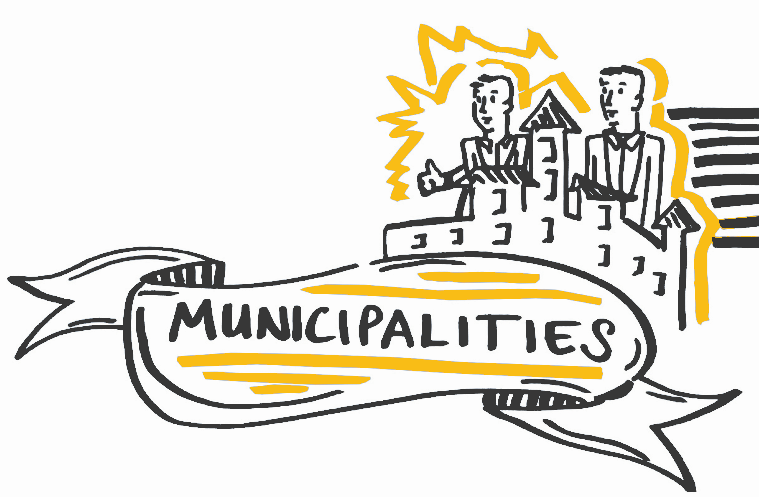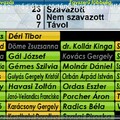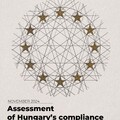K-Monitor, investigative portal atlatszo.hu and TI Hungary organized a campaign called “This is the minimum!” prior to the Hungarian local elections held in October, asking candidates to commit themselves to six transparency measures if elected. Measures include improvements regarding the transparency of the budget, the decision making process, contracts and procurements, asset declarations and local government owned enterprises. These minimum commitments would not only ensure basic transparency standards, but have a strong anti-corruption effect, furthermore they would create the foundation for the introduction of participatory processes.

By the time of the elections, around 390 candidates pledged to implement the minimum program. 170 of them were elected as representatives, including 5 county representatives, 14 mayors, and Gergely Karácsony, the new mayor of Budapest.
As a symbolic step, Mr. Karácsony made the minimum program part of the agenda of the inaugural meeting of the Budapest city council held on November 5th, and invited TI Hungary’s Miklós Ligeti to speak at the plenary in favour of the program. Members of the city council unanimously passed a decision about the implementation of the minimum program. Fun fact: even representatives of Fidesz, now in opposition in the Budapest Assembly, voted in favor of the proposal. During the campaign, there was not a single Fidesz-candidate who would sign the pledge.
In the following months, partners behind Ez a minimum! will support the process of developing local transparency decrees and changes of local procedural rules and start monitoring the implementation of commitments.
K-Monitor also supports the process with fresh background materials and blogposts that can serve as inspiration to go even beyond the commitments and create anti-corruption frameworks that are tailored to the needs of the given municipality. K-Monitor also collaborates with local civil society, so that they can effectively advocate for the incorporation of measures that are locally relevant and also to open up legislative procedures and foster the participation of citizens in the process.
Elements of the Ez a minimum! program:
1. Transparency of the decision making process
Agendas, bills, meeting minutes: All municipal assembly agendas, bills and their appendices should be made publicly available prior to assembly meetings. Meeting minutes should be released as soon as possible after the meeting, in an online, searchable database (e.g. in html, txt, rtf, word, odt formats).
Trackable debates and decisions: Whenever possible, voting records for each representative should be available in an electronic version. In cities with more than 50,000 inhabitants, minutes should be filed in a database, which contains all topics discussed and other metadata for better searchability. These keywords shall be displayed on the relevant sub-sites of the municipality, along the title and date of the meeting.
Transparency of assembly meetings: The municipality should ensure that interested members of the public can attend assembly sessions, and can make video and/or audio recordings (with the exception of closed sessions). Cities with more than 50,000 inhabitants should stream assembly meetings online.
2. Freedom of Information requests
Pro-transparency municipality: The municipality should ensure that, by default, information requests under the Freedom of Information (FOI) Act are answered free of charge.
Transparency of data requests: FOI requests and replies should be made public within two weeks of the query being resolved.
3. Transparency of the Budget
Transparency of the budgeting process: The municipality’s budget, along with easy-to-understand figures, should be made available on the municipality’s website. In addition, the approved budget, its amendments, and interim and annual reports on its implementation should be downloadable in raw, machine-readable, table format, using COFOG categories or according to the system of the Hungarian State Treasury. Budgets of previous years should remain available for the whole term, in a raw, machine-readable format.
Budgets of companies owned by the municipality: The municipality should release budgets of companies and institutions that are controlled by the council. Data should be made available in formats as the council’s budget.
Transparent budgeting: The municipality should release documents of the budget planning process (e.g. general directives, negotiations with institution heads), and the budget draft in which they explain, in an easy-to-understand manner, the content of the directives, provide adequate argumentation for any changes that are to be implemented, and introduce the budget plan according to the aspects of budget balance.
Publicity of the municipalitie’s applications for EU or government subsidies: The municipality should report on funding applications submitted to various institutions (e.g. ministries, EU-programs) and disclose proactively project title, deadlines, amounts, descriptions and reports.
4. Transparency of contracts and public procurements
Proactively published contracts: As part of the contracting process, the municipality should make all contracts (and their amendments) publicly available on their website. The most important data of the contracts should be available in an electronic, searchable database (dates, name of contractor, amount, subject, amount and validity of contract). In addition, the exact wording of the contracts should be released in an electronic format.
Public procurements: Public procurements conducted or administered by the municipality which are over the value of 1 million HUF (~3000 EUR), their amendments, and documents related to the procurement and the pre-procurement selection process (advertisements about the process, miscellaneous documents such as: contract draft, technical manual, call for bids, summary of the offers’ evaluations, names of decision makers, specific offers) should be made public through the central Electronic Procurement System (EKR). Documentation on contract deliveries should also be available. The link to the information available in EKR should be displayed on the website of the municipality.
Transparent real estate deals: In the case of contracts related to selling and renting real estate, exact details of the property and its appraisal should be made available. In the case of properties sold or rented below the market value, a justification should be made available.
5. Municipality owned enterprises
Trackable ownership and leadership structure: The municipality should release the list of companies it ownes, including percentage of shares. Companies should release their current leadership structure, the composition of their most important decision making bodies, their organizational structure, strategy, annual plans, and procedural and organizational regulations.
Transparent financial management: companies owned by the municipality, similarly to their owners, should include on their websites a searchable database of contracts, including the text of the contracts, amendments, and the documentation of the pre-contractual selection process, to the greatest extent possible. Companies should make procurements with a value over 1 million HUF (~3000 EUR) available in EKR.
Transparent performance: Annual budget reports, audit and other reports of companies owned fully or partially by the municipality should be made available on the website of the given company.
Remunerations including bonuses: Salaries and bonuses received by decision makers should be made public.
Anti-corruption mechanisms, handling complaints, whistleblowing: Companies with an annual budget of over 100 million HUF (~300.000 EUR) should develop and release internal anti-corruption regulations, approved by the municipality. Companies should develop procedures for dealing with complaints, and establish disclosure channels for whistleblowers. Resolutions of complaints should be published annually in the form of a report on their website.
6. Accountability of decision makers
Publicly available asset declarations: Asset declarations of all representatives, mayors, deputy-mayors and heads of municipality owned enterprises should be publicly available on the website of the municipality, in a machine readable format, whenever possible. These declarations should be updated annually, and previous ones should be made available until the respective representatives and officers are holding positions in the municipality and its companies.
Transparent procedure for investigating asset declarations: The city council should issue a decree that sets forth the procedure for investigating asset declarations. Decisions resulting from such procedures should be justified by the relevant committee and should be released on the municipality’s website.
Work carried out by council representatives in charge of specific areas: Remuneration and list of duties for special council representatives in charge of specific areas should be made publicly available. Reports on the work carried out in previous years should be available too.
The map of elected candidates pledged for This is the Minimum!:

Many thanks to our volunteer, Zsófia Suba who helped with the translation.
Címkék: english ezaminimum
2 komment
A bejegyzés trackback címe:
Kommentek:
A hozzászólások a vonatkozó jogszabályok értelmében felhasználói tartalomnak minősülnek, értük a szolgáltatás technikai üzemeltetője semmilyen felelősséget nem vállal, azokat nem ellenőrzi. Kifogás esetén forduljon a blog szerkesztőjéhez. Részletek a Felhasználási feltételekben és az adatvédelmi tájékoztatóban.
2019.11.17. 12:46:47
2019.11.17. 12:56:54
és kétféle szar szermét ember van. az egyik azt mondja, hogy az állami potentátok visszaélhessenek ezzel. ezért csak a soros alapítványt és társai problémásak. azok is. a szar szemét embereknek a másik fele, a k-monitor és az összes társaik, akik a soros alapítvány megbízásából azt mondják, hogy csak az államot kell ellenőrizni. a piaci szereplők visszaélhessenek ezzel. borkai ügyvédje problémás. benfentes módon kereskedik az ingatlanokkal. és a többi ügyvéd luxemburgban. azok nem?
mivel budapesten nincs a fogyasztást megalapozó szabad piaci árutermelés az a kérdés, hogy ki teremtse a semmiből a pénzt és annak nagy részét ki tegye zsebre.





